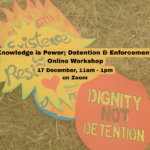Last month, Right to Remain were in Belfast delivering training on the substantive asylum interview to a group of peers. We spoke with Blessing, one of the peer coordinators, about what advice she would give someone preparing for the substantive interview.
What would be the main advice you would give to someone who has made their claim for asylum, and are awaiting their substantial interview? What are the main things that you wish you had known before?
I would advise them to know their story, and to stick to their story.
The first screening interview is like a brief story. So when you go for the main (substantial) one, it’s carrying on from that, from what you have said before. Since that was the introduction, you now have to say the main points.
Always remember what you said before. Try not to complicate it, because the more you complicate it you are going to complicate yourself as well.
So if you say exactly as is, its just going to be easier.
The Home Office will trying to make you remember things, they will be forcing you to remember things that you cant even remember, but always try and just tell them that “I can’t remember.” If you remember you remember, but if you can’t, just say “I can’t remember.”
Don’t try to answer the questions that you don’t even know. Because they are going to use that against you.
So always tell your story as it is.
If you haven’t had much experience with the Home Office before – about their staff, about the approach they take – what kind of advice would you give to someone?
The Home Office is not your friend! Some people seeking asylum may say “I want to chose a woman for the interview” – since you are a woman you think that a woman is going to sympathise with you.
You have a right to chose whether you want to be interviewed by a man or a woman, but what I mean is that they are not going to sympathises with you – they are not your friends.
So I would advise that no matter how uncomfortable you are telling your story to the other person (the interviewer), the best you can do is tell the truth as it is. If something happened to you, if you can say it you have to say it.
Because if you keep some of the story to yourself, and say “I can’t say it, I’m not comfortable saying it”, it’s not going to give creditability to your story. You have to tell it like it is, you just have to say it.
What are your thoughts about mock interviews, practising with a friend?
I think it’s a great thing. As for me, I didn’t have that opportunity. When I went to the interview, I wasn’t prepared. I didn’t know. So I was nervous.
If you have a chance to do it, do it! Practice with someone. If there are other things you can’t say, sensitive things – it’s not easy. But try. Practising gives you the confidence you need for when you go to the interview.
What advice can you give in dealing with your solicitor in the run up to the interview?
When you are preparing for the interview, if you have evidence – it’s best to show your solicitor first. The solicitor is the first person that you see after applying for asylum, before you even go for screening interview, you meet your solicitor.
So you tell your solicitor your story first, it’s him who knows your story before even the Home Office. So I think it would be good advice to first show him some of the evidence that you have.
Because some of the evidence that you have, you might not show him, and then show it to the Home Office, not knowing if its useful. So if you show it to your solicitor first, you’ll know whether its needed or not.
For more advice on navigating the substantive interview, and other parts of the asylum and immigration process, use our Toolkit. If you are in Belfast and want to get involved with the peer group mentioned, contact Claudia (claudia.belloni@burc.org).
















Discussion: